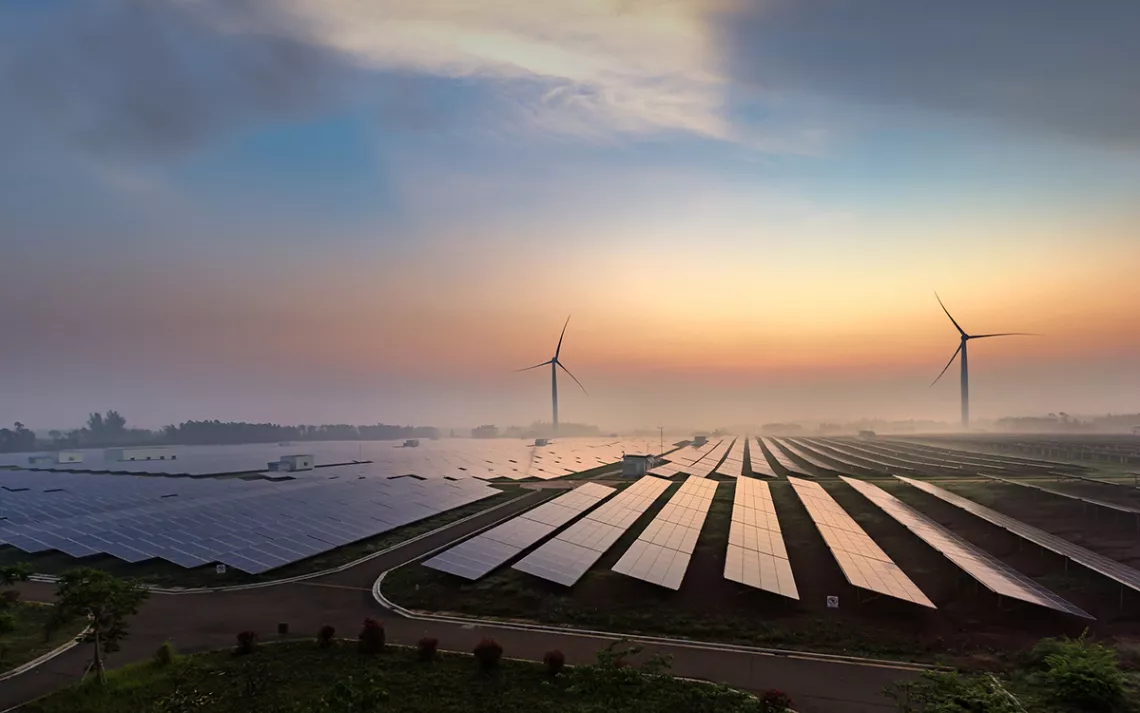It’s Do or Die Time for Build Back Better
Democratic leaders need to salvage this must-pass climate legislation before the midterm elections consume Washington

Photo by huangyifei/iStock
In the year since Joe Biden was inaugurated president, environmentalists have said again and again that the combination of this administration and this Democratic-controlled Congress is the last best chance to pass a climate bill. The warning is a year old, but the urgency remains as real as ever. This is a do-or-die moment to pass federal laws to tackle the climate crisis.
Democrats are running against two clocks. One is political: With President Biden’s approval rating flatlining and COVID-19 cases and inflation increasing, most political pundits say Democrats will very likely lose their thin majorities in one or both chambers of Congress this fall. The other is geologic: With global greenhouse gas emissions and temperatures continuing to rise, scientists say we are likely to lose the opportunity to salvage a livable climate without sweeping action.
The extent to which human activity has already destabilized the climate is clear: Historic December tornadoes in the Midwest. Record heat in Alaska the day after Christmas. Wildfires in Colorado months after the end of the traditional wildfire season. According to NOAA, 2021 was Earth’s sixth-warmest year on record. The planet’s seven warmest years have been the past seven. And it is only going to get hotter. Without major action to reduce greenhouse gas emissions, global temperatures are on track to rise 4.5 to 8 degrees Fahrenheit (2.5 to 4.5 degrees Celsius) by 2100. If the United States doesn’t meet its commitment to reduce its emissions, the world will fail to avoid catastrophic climate change.
“These higher temperatures continue to be a blaring siren that Congress needs to take action as soon as possible,” said David Shadburn, a government affairs advocate for the League of Conservation Voters.
The bulk of Democrats’ climate policy has been woven into the $2.2 billion Build Back Better Act. But that proposed bill is stalled in the Senate. Senator Joe Manchin, the Democrat of West Virginia who has made a personal fortune from his fossil fuel investments, gave his party a big fat lump of coal for Christmas when, after months of negotiating, he said he could not vote for the legislative package as is. “I can’t get there,” Manchin told Fox News. “This is a ‘no’ on this legislation.”
But that Christmas Eve bombshell wasn’t the end of the Build Back Better saga. At least one cause for optimism is that Manchin seems to support the climate provisions in the bill. “The climate thing is one that we probably can come to an agreement much easier than anything else,” Manchin told reporters in early January. Democrats' strategy for passing climate policy has been likened to giving medicine to a dog—you have to hide it in a spoonful of infrastructure peanut butter to get it down the legislative gullet. It’s a strategy that explains how the United Mine Workers of America, which describes its mission in life as lobbying for the interests of coal miners, has pleaded with Manchin to reconsider his opposition to the Build Back Better Act.
At the same time, Manchin’s support of the climate provisions in the Build Back Better Act is largely because he has already knocked the teeth out of them. In October, he said he would not vote for Democrats’ flagship climate policy, a program that would have required power companies to rapidly replace fossil fuels with renewables such as solar and wind or pay a penalty. What’s left is more than $500 billion for a suite of clean energy tax credits, making buildings more energy-efficient and restoring forests and farmland so that they sequester carbon.
“He took his pound of flesh,” said Melinda Pierce, the legislative director of the Sierra Club. “Do I expect him to nibble around the edges more, and will those bites hurt? Yes. But the climate piece has largely come to a conclusion.”
It’s safe to assume that, if the Senate ever passes the Build Back Better Act, it will include the climate provisions as they are currently written. As it stands, the bill would be the largest investment the US has ever made in curbing climate change. It is also insufficient.
An analysis published in October by the research firm Rhodium Group found that the climate provisions in the Build Back Better Act would put the United States on the path to meeting Biden’s goal to reduce US greenhouse gas emissions by at least 50 percent below 2005 levels by 2030. However, the analysis stressed this would also require a concerted regulatory effort from the White House, states, cities, and corporations to bring down carbon pollution.
In the last few weeks, the Biden administration has proposed rules establishing efficiency standards for light bulbs and limiting pollution from automobile tailpipes. It is racing to develop offshore wind projects that will produce clean energy and deploy new transmission lines (paid for by the bipartisan infrastructure law) to deliver it. But many of the regulatory actions modeled by the Rhodium Group—including new emissions standards for electricity production and industry—remain outstanding.
To meet Biden’s pledge to fulfill the targets of the Paris Agreement, the United States will have to cut emissions 5.2 to 5.6 percent each year for the next decade, and a more recent analysis by the Rhodium Group found that we’re moving in the wrong direction. US greenhouse gas emissions increased by more than 6 percent last year—largely due to a jump in coal-fired power generation and trucking. The upshot: We’re one year into the decade and the gap between the emissions reductions provided by the Build Back Better Act and the emissions reductions that need to happen to meet Biden’s goal got a bit wider.
“Another year of emissions in the atmosphere is problematic,” said Ben King, a senior analyst for the Rhodium Group. “There is certainly time to reverse it, but it underscores that we need legislation to drive reductions, and we need it to happen sooner rather than later.”
Senator Chuck Schumer, a Democrat of New York and the majority leader, has vowed to pivot the Senate’s attention back to Build Back Better the last week in January. Speaker Nancy Pelosi, a Democrat of California, has set March 1, when Biden will address Congress in his first State of the Union, as the deadline for the bill’s final passage.
In the meantime, Democrats are forging ahead with a longshot effort to pass voting rights protections through Congress. In early January, Biden urged the Senate to alter the filibuster to pass federal legislation that would roll back new voting restrictions and reign in partisan gerrymandering. “I’ve been having these quiet conversations with members of Congress for the last two months,” Biden said in Atlanta in early January. “I’m tired of being quiet!”
The president’s vocal defense of voting rights may be just the right strategy for defending democracy. But if Biden has learned anything from the failure to pass the Build Back Better Act, it’s that being loud is not always the smartest legislative strategy. Manchin does not react well when he’s called out, and there is no evidence that Democrats will have any better luck goading him into altering the filibuster than they have compelling him to abandon his objections to Build Back Better.
“I think we learned that it is in our interest to not blow everything up in public,” the Sierra Club’s Pierce said. “Getting off that roller coaster, the daily monitoring of every shift in the negotiations and Senator Manchin’s dispositions, and allowing the conversation to be more private, is a good thing.”
While Democrats have moved the battle for voting rights into the public’s gaze, they’ve pushed Build Back Better and its climate provisions into the realm of quiet conversation. Whether this strategic silence will improve the political prospects for Build Back Better is far from certain. The only thing that is clear is that we are running out of time. By spring, lawmakers will shift their attention to the midterm election, and the window to pass major legislation will close. Hopefully, the repeated warnings will have been heeded by then.
 The Magazine of The Sierra Club
The Magazine of The Sierra Club



